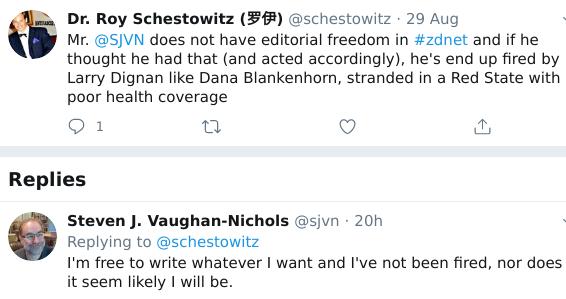

THE term "Journalist" isn't one that I use a lot; yes, Journalism Schools exist and people are trained to become "Journalists" by occupation/profession. They're taught how to fact-check, strike balance, give the accused/exposed an opportunity to respond before publication and so on. I'd be the last person to bash Journalism as an occupation, especially what's known as Investigative Journalism (capitalised intentionally; it's a label). Investigative Journalism takes a very, very long time (sometimes months to properly study just one topic). If financially compensated for the time, it's very expensive (thus rare).
"...some former "professional journalists" have become cynical about the whole thing and became independent after getting censored or self-censored (or being assigned 'stories' which are actually commercials for sponsors, i.e. spam in "report" clothing)."I became a lot more cynical about the above, seeing the failure to cover scandals at the European Patent Office (EPO). I spoke to and even met some people who tried to cover the scandals. I heard all sorts of stories, which aligned with my personal experience as a columnist. The editors and publishers exercise control and pressure on people whom they supposedly employ and pay to cover truth. The real client or customer isn't readers but advertisers; the audience is the "product" sold to the advertisers and the larger the audience, the more valuable the "product". It's a little distressing when one realises it; some former "professional journalists" have become cynical about the whole thing and became independent after getting censored or self-censored (or being assigned 'stories' which are actually commercials for sponsors, i.e. spam in "report" clothing). "Whitepapers" aren't that much different from many so-called 'articles' (except the way they're presented and disclosures/length/depth).
So... what is Techrights?
We're quite versatile. But our sole guiding principle or goal is truth. Covering just truth isn't always easy; you get bullied for it (e.g. lawyers and SLAPP). We already have a track record of accuracy and we try to always get the facts right, especially facts that are suppressed and commonly distorted.
"We're quite versatile. But our sole guiding principle or goal is truth."How is this achieved? Well, for one thing, quality evidence (e.g. police FOIA) is required. So we've established a high degree of trust with sources in various places, including disgruntled employees and former employees. Whistleblowers in some cases. They're unhappy with press coverage that they encounter. Stenography is an insult to their intelligence. e.g. lies from António Campinos and Benoît Battistelli, or propaganda about software patents in Europe (usually from European law firms, looking to increase litigation, even at the expense of innovation).
Leaks are very important to us because this is how we can produce unique (the press says "exclusive") stories that are backed by hard material, e.g. words right from the horse's mouth. Those who have not established a solid publication record will struggle to get any leaks at all because a high degree of trust and technical competence with encryption is required. People don't put their job at risk just to get some article or few articles published by somebody else. Protection of sources is something we're proud to say we've excelled at; to the best of our knowledge we have a 100% source protection record, which is rare (even Wikileaks had many of its sources caught and prosecuted).
"There's this misconception which goes along the lines of, the bigger the news site is, the more reliable it must be."Regardless of labels ("journalism" or whatnot), what really matters is accuracy. We want to publish only truthful information. Sometimes we keep the corresponding evidence close to our chest (unpublished) because there's no other choice for source protection.
Don't be drawn in or enticed or seduced by graphical effects of sites, budgets of sites, number of employees etc. There's this misconception which goes along the lines of, the bigger the news site is, the more reliable it must be. Such sites want people to think or at least feel that way; but their work is typically controlled by rich people who conditionally bankroll the whole operation, looking to get something in return (agenda-setting). ⬆